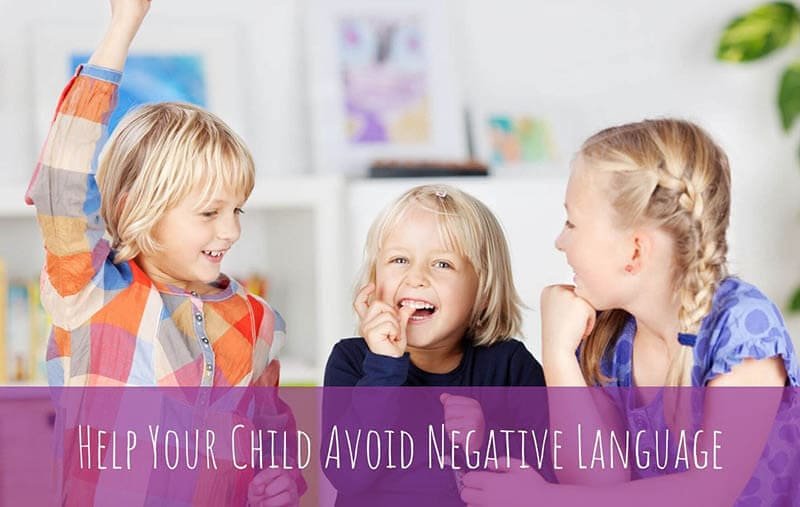Help Your Child Avoid Negative Language
Language…lovely language! It can be the key to living well or destroying lives. The power of the tongue is well known in every culture, religion and time in history.
Language is the magic sauce to every human relationship - within ourselves and with our relationships to others. It’s never the wrong time to start embracing exceptional language and teaching our children to do the same.
It’s so easy to underestimate the impact of negative speech on our children and in our lives. Can you identify any of the negative language patterns you currently use?
The Master Key
Using positive language is the master key to healthy human relationships. So, getting it spot on is super critical!
Negative speech patterns affects us not only on the outside…but also in our internal world. We need to lead by example and show our children through the words we choose about ourselves and others that we are capable of choosing awesome language.
If we convey belief in our children through our own positivity, they will see themselves as competent individuals who are able to choose awesome language themselves. As adults, we are totally adept at helping them build that self-perception!
You talk to yourself more than anyone else. So be sure to get it right! Your kiddos are always watching.
Words are singularly the most powerful force available to humanity. We can choose to use this force constructively with words of encouragement and empowerment, or destructively using words of despair and disempowerment.
“Words have energy and power with the ability to help, to heal, to hinder, to hurt, to harm, to humiliate and to humble.”-Yehuda Berg
Don’t ‘Should’ Yourself!
Don’t ‘should’ yourself!
When you think, ‘I SHOULD do this…or I CAN’T do that…’ it limits you on so many levels.
You get stuck in believing the lies that you tell yourself! And even worse…you’re teaching your children to do the same thing.
That’s horrible, right? We never want to see our kids stuck in a rut or suffering because of negative patterns we’ve passed on. All the more reason to be hyper-aware of when we’re ‘shoulding’ ourselves.
Learn to identify where you’re allowing limiting language patterns in your speech.
Guilt-ridden or negative words like should, should have, can’t, didn’t, don’t, won’t are all good clues to when you can shift those words from boooo to woo-hoooo! Also, name calling is a big no-no! Words like stupid, idiot, whiner, incapable or dumb can never leave your lips…and that goes for your kiddos, too.
Everyone in your household needs to be held accountable for using empowering and uplifting language at all times.
Remember, our tone and emotion are pieces of our communication as much as our language choices. Keep careful tabs on what you're conveying to your little people. It’s okay to have bad days or feel sad, but this doesn’t give you an excuse for stinkin’ thinkin’ and lousy language to hang around 24/7.
Instead of choosing poor speech that breaks us down & gets us into trouble, let’s choose solution language! We have so many awesome choices when it comes to vocabulary, there’s really no excuse to use anything but the best.
Words like will, have, do, can and how can I are super-powers!! They create fantastic feelings and allows you to control the situations by watering the seeds we’ve been planting for a healthy growth mindset.
Having a system for when you realize you’re ‘shoulding’ will really help! Some people like to keep a rubber band around their wrist and when they realise they’re not doing your best with minding their language, they give it a light snap. Others self-correct out loud - which acknowledges the change in language and meaning for all to witness.
This goes for self-talk, too! Even if no one else can hear you, it's important to properly manage your inner-speech.
How can you get your message across without using any negative words or speech? Create a plan and stick to it!
"Raise your words, not your voice. It is rain that grows flowers, not thunder."- Rumi
Lovely Language
Now we know that using positive language encourages positive behaviour and proactive mindset in our little ones! If you want positive behaviour, the first place to start is using positive, empowering speech and backing it up by example.
It’s never too early (or too late! ⏰ ) to start making simple changes in your tone and wording.
It will make a big difference in your children’s responses, whether or not they listen and their co-operation.
So flip those negatives into positives and watch the magic unfold!
Watch the video - Where to Start With Your Language
Xo Lisa oX TL;DR
Watch the video to learn where to start with your language in your household
Read the entire blog post - Where to start with your language



